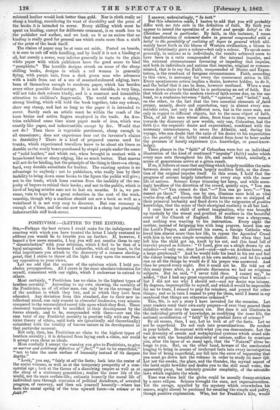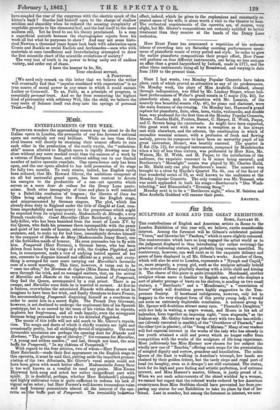POSITIVISM :—(LETTER TO TIIE EDITOR).
STR,—Perhaps the best return I could make for the indulgence and courtesy with which you have treated the letter I lately ventured to address you would be to trouble you no further. If, however, I hazprd a few more remarks, I beg you will not ascribe them to any "dissatisfaction" with your criticism, which I feel to be that of a loyal antagonist. It is because I subscribe, with all my heart, to the vital importance you attach to the discovery of a common startingpoint, that I strive to throw all the light I may upon the sources of myopposition to your views.
Let me add that the nature of the opinions which I hold precludes propagandism. All I crave is the same absolute toleration for myself, consistent with our rights, which I endeavour to extend to others.
Most certainly, "Positivism has no claim to the highest types of heathen morality." According to my own showing, the morality of the Positivists, as of all other men, can only be on the average that of the medium in which they live, and in which they have been educated. Any deviation from this standard, due to their new intellectual creed, can only consist in elemental tendencies, very minute compared to the accumulated moral tide upon which they float. These elemental tendencies will be modified in their development by the forces already, and to be, compounded with them—nor can the sum total of any Positivist morality in practice tally with any Positivist theory of ethics, until both are (practically and theoretically) coincident with the totality of human nature in its development at that particular moment. Not only, then, has Positivism no claim to the highest types of heathen morality; it is debarred from laying such a claim, nor could it accept even these as ideals.
Most cordially I accept the warning you give to Positivists, to give no narrow and arbitrary definition of "fact,' "not to be superficial," "not to take the mere surface of humanity instead of its deepest depths."
"Look," you say, "fairly at all the facts; look into the crater of the social volcano, as well as at the temporary prosperity of a commercial age ; look at the throes of a dissolving empire as well as at the sleep of a stationary generation; realize the inner life of the world, not its mere surface-life; estimate honestly the moral life of individual men through centuries of political decadence, of arrested progress, of recovery, and then ask yourself honestly—where has been the moral spring of the true upward force—is science or is failh I answer, unhesitatingly, "Is both." But this admission made, I hasten to add that you will probably differ with me foto aelo in the definition of faith. By faith you appear to intend the operation of a direct and specific belief in the
Christian creed in particular. By faith, in this instance, I mean that manifestation of vehement desire in general compounded with a
belief in the possibility of realizing all hopes in general which ulti mately burst forth in the bloom of Western civilization, a bloom to which Christianity gave a colour—but only a colour. To speak more generally, in nations as in individuals, the results achieved seem to have been in i ratio compounded of the internal impulse, and the external circumstances favouring or impeding that impulse, and both in individuals and nations that impulse, original or communicated, that is to say the Faith, 'compounded of Desire and Expectation, is the resultant of foregone circumstances. Faith, according to this view, is necessary for every the commonest action in life. Every spontaneous action implies a desire, however hidden, to do it, and the belief that it can be done, however confused. When a man comes down stairs to breakfast he is performing an act of faith. But that which so clouds the modern views of faith seems due, on the one hand, to a confusion between "faith," "opinion," and "belief," and, on the other, to the fact that the two essential elements of faith proper, namely, desire and expectation, vary in almost every con ceivable ratio, not only in different men, but in the same man, not only in regard to different objects, but to the same object of faith. Thus, of all the men whose ideas, from time to time, were turned towards the discovery ofnew worlds, only one, Columbus, had the faith (i.e. the requisite desire and expectation), combined with the
necessary circumstances, to cross the Atlantic, and, during his voyage, who can doubt that the ratio of his desire to his expectation (i.e. the quality of his faith) varied almost frpm hour to hour under the pressure of hourly experience (i.e. knowledge, or quasi-knowledge).
These phases in the "faith" of Columbus were but an individual illustration of the kind of continued "impulse" (faith) under which every man acts throughout his life, and wider which, similarly, a series of generations arrive at a given result. If so, it follows at once that anythingwhich largelymodifies the ratio between desire and expectation largely modifies faith, or the direc tion of the original impulse itself. In this sense, I hold that the progress of science largely interferes at every step with the inner life of nations. Science keeps trimming her lamp, and while seem ingly heedless of the direction of the crowd, quietly says, "You can
do this."—"You cannot do that."—" You can go here."—" You. cannot go there." Thus, one by one, illusions once held as vital
truths drop off, and creeds that filled the heavens are so stripped of their primeval barbarity and fined down to the exigencies of positive knowledge, that the sense of their aboriginal rusticity is all but lost. I once knew a child of ardent imagination, who was brought up tenderly by the wisest and gentlest of mothers in the beautiful creed of the Church of England. His father was a clergyman, and nothing was wanting to his instruction. Every night the mother, instead of fatiguing him with long prayers, heard him say the Lord's Prayer, and allowed his nurse, a foreign Catholic who loved him almost more than her life, to repeat the Apostles' Creed with him in her own simple mountain dialect. But when they had left him the child got up, knelt by his cot, and (his head fall of travels) prayed as follows : "0 Lord, give me a sleigh drawn by six reindeer—or only one, dear Lord—and—and—an Arabian horse, and a large greyhound." And he would hide his head in his cot and feel the colour coming to his cheek at his own audacity, and let his mind run on all the things he would do if his prayer was answered. And thus he prayed every night. But it could not be. He told me of this many years after, in a private discussion we had on religious subjects. But he said, "I never told them. I cannot say," he
added, "that I had any great expectation of getting what I wished—
but I did not see why I should not—and my desire was intense. By degrees, imperceptible to myself, and which it would be impossible for me to trace, I ceased to pray for reindeer, and prayed for other things; and so in tarn I ceased to pray for them, until I learnt in my manhood that things are otherwise ordained." This, Sir, is not a story I have invented for the occasion. Let your readers recal their own early prayers—if ever they poured their
childlike wishes into the unseen ear. But does it not illustrate in the individual growth of knowledge' as modifying the inner life, the national modification of "faith" by the gradual dawn of science?
By all means, then, I say, Let us look at all the facts. Let us not be superficial. Do not rash into generalizations. Be modest in your beliefs. Be content with what you can demonstrate. Let the vast diversity of creeds and metaphysical systems which stand side by side with the beautiful simplicity of science, suffice to convince you, after the lapse of so many ages, that the "Natural" alone be longs to you. But, on the other hand, beware of the uneducated longing to bring in armies of irrelevant facts into every investigation for fear of being superficial, nor fall into the error of supposing that
you must go down into the volcano in order to study its inner lift.
Let not the smoke, the glare, and the thunder, the myriad aspect of the lurid night bewilder and deafen you to the still small voice, the apparently puny, but infinitely grander simplicity, of the scientific laws which regulate the whole. Time was when half the globe could be morally frenzy-stricken by a mere eclipse. Science wrought the care, not supernaturalism. Yet the savage, appalled by the mystery which overwhelms his senses, might almost be pardoned for scouting the simple and paltry, though positive explanation. Who, but for Franklin's kite, would have coupled the roar of the empyrean with the electric spark of the kitten's back? Goethe laid himself open to the charge of shallow sciolism and absurdity when he reduced the amazing complexity of vegetable growths to the elemental leaf, and the leaf itself to the more uniform cell. Yet he lived to see his theory proclaimed. Is a map a superficial untruth because the chartographer rejects from his work all but what he purposes to show? And may not some historical Newton a thousand years hence look back with admiration upon Comte and Buckle as social Euclids and Archimedes—men who with materials at once insufficient and Overwhelming attempted to draw the first scientific chart of the scientific evolutions of society? The very test of truth is its power to bring unity out of endless variety, and order out of chaos. • I have the honour to be, Sir, Your obedient servant,
A POSITIVIST. e need only remark on this letter that we believe the writer will eventually find that "impulse combined with expectation" is no i
true source of moral power n any sense in which it could sustain Luther or Cromwell. To us, Faith, as a principle of progress, is essentially personal trust. And so far from connecting the highest kind of personality with arbitrary Will, like the child, we believe the very roots of Science itself run deep into the springs of personal Trust.—En.]































 Previous page
Previous page